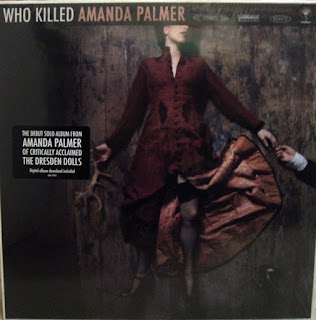Who Killed Amanda Palmer
Amanda Palmer
Roadrunner 834672
2008
I currently have this album in three formats. I initially bought the CD. Then I found out there was a dvd of it and I
bought that and finally I picked up the vinyl.
I think the ideal format of it is actually the dvd. Amanda Palmer is such a compelling and
charismatic performer that the rock video is the best vehicle for her music
(aside from seeing her live.) I was
lukewarm about her previous group, the Dresden Dolls until I saw the video for
"Coin Operated Boy" which made me an instant fan. When I feel like hearing the Dolls I'm more
likely to reach for one of their performance dvds than a CD. Even without the visual element though, this
is still a terrific record. This was her
debut record as a solo artist and it is consistent with the style and themes of
her music with the Dresden Dolls, the big difference is the instrumentation
which is a lot more elaborate with guitars, horns and strings adding color to
the music. The music is still driven by
Palmer's piano, but it is more powerful than any of the Dolls' records. Probably some of that can be credited to
producer Ben Folds who knows something about making exciting music centered
around a piano. This is a dark record,
the most upbeat and funny song, "Oasis," features date rape and an
abortion, so you can imagine what the rest of the record is like. There is no answer to the title question on
the record, but if I were to hazard a guess, I'd say the killer was probably
one of her exes, most likely the guy in "Ampersand" which is my
favorite song on the album. It is an
amazing song, very powerful musically with a passionate vocal from Palmer as
she makes a feminist statement of freedom and eviscerates her crazy lover. That line about "eyes full of
ketchup" is just brilliant.
"Another Year: A Short History of Almost Something" is another
tremendous song. I believe it is about
fear of commitment, but it might as well be about suicide it is so gloomy. When I listen to it I feel like I'm at a
funeral. Palmer sings her heart out, her
vocal gives me chills. "Astronaut:
A Short History of Nearly Nothing" gets the album off to a rousing start
with its crashing piano chords and I love Zoe Keating sawing away on the cello
throughout the song. I may be in the
minority here, but I think a cello makes just about any pop song better. I believe the song is about a woman lamenting
her astronaut lover's death although it also works as a song of neglected
love. It would make a nice response to
Bowie's "Space Oddity" telling the story of Major Tom's wife.
"Strength Through Music" is about a kid on a shooting rampage, I find
her ticking very unnerving. "Runs
In the Family" is a cousin to the Dolls' "Girl Anachronism" as
it explores hereditary illness both physical and mental, family shame and
avoiding responsibility for one's actions.
In "Leeds United" it sounds like Palmer is ragging on an
English boyfriend. I like her husky,
hoarse vocal and I'm pleasantly surprised by the effectiveness of the horns
used to augment the song. "Blake
Says" dissects another commitment-phobe boyfriend using references to Lou
Reed and the Velvet Underground. This
song features Keating on cello again as well as some nice synthesizer work from
Ben Folds. Folds' synthesizer is also
very prominent in "Guitar Hero" which showcases some guitar shredding
from East Bay Ray of the Dead Kennedys.
She criticizes video game addicts in this song. The cover of "What's the Use of
Wond'rin" from the musical "Carousel" is largely sung by guest
vocalist Annie Clark aka St. Vincent.
Palmer presumably included it as a statement of irony, since its
stand-by-your-man message is contradicted by this entire record. With its music box-like chimes and Clark's
almost mechanical vocal, it sounds like something out of a David Lynch movie,
it makes Rodgers and Hammerstein seem creepy.
I don't really get "Have to Drive" but I dig the strings and
choir. I think it is using roadkill to
make some points about escapism, escapism is a recurring theme on this
record. It is evident in "The Point
of It All" which is another one of my favorite songs on the record. The subject of the song is so withdrawn and
depressed as to shut his or herself off from the world. I suppose the needle in the song could be a
drug reference, but I prefer to think of it as a metaphor. I find this album endlessly fascinating. I don't think Palmer's music is confessional,
but it is personal and intimate.
Listening to this record is like having dinner with her or at least her
persona anyway. She tells you things you
don't normally hear on a pop record.
I've been listening to this record repeatedly over the past couple of
weeks trying to write this post, on top of all the times I listened to the CD
when I first got it so I would guess I've heard it at least fifty times and it
still sends me. I hear new stuff or pick
up something new in the lyrics every time I play it. It is musically and lyrically complex and
emotionally honest and expressive.
Recommended for Tori Amos fans looking for something a little more edgy
and ornery.



































